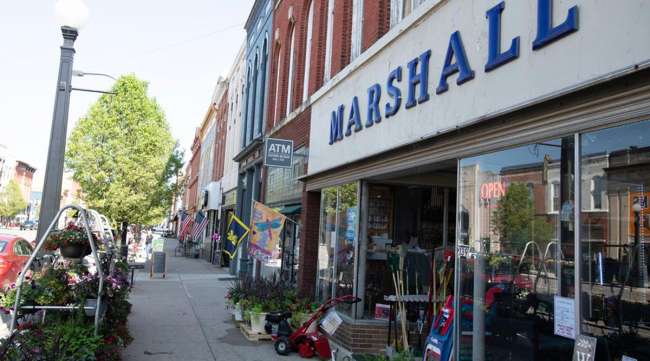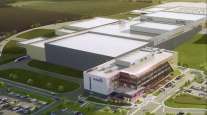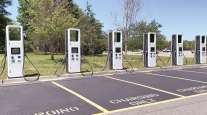mlive.com
Michigan Town Rests Economic Hopes on Ford Battery Plant

[Stay on top of transportation news: Get TTNews in your inbox.]
A historic town could find new life in the electric vehicle revolution — at least that’s what downtown business owners are hoping.
Advocates for Ford’s $3.5 billion electric vehicle lithium-ion battery plant in Marshall, Mich., say the 2,500 jobs it promises are much needed for the city of less than 7,000.
Maintaining the bustling downtown and its historic buildings is expensive, said Michael Lounds, owner of the Bogar Theatre, the oldest building on Marshall’s main street. Lounds, 53, is budgeting for a $30,000 roof repair in the near future.
Coming off the pandemic shutdown and high inflation, small businesses downtown are feeling strained.
“I don’t expect this place on its own to be our whole savior,” Lounds said. “I expect it to anchor us a little bit so that we aren’t as susceptible to those ebbs and flows.”
The sprawling 2.5 million-square-foot battery facility on 1,900 acres of farmland in Marshall Township has sparked debates over environmental impact, government transparency, tax incentives and geopolitical implications — all aired during a six-hour public comment session this month.

Google maps
Above all else, the rallying cry from the opposition is “Save Historic Marshall.”
The Marshall community prides itself on maintaining its history, dating to 1830. The city is home to Michigan’s oldest hotel and sits on the list of National Historic Landmark Districts, of which there are 2,600 in the U.S. and only 43 in Michigan.
Marshall’s economy and population shrank with the exit of State Farm Insurance’s regional office in 2003 among other corporate employers leaving the small town.
“You have to replace that. Cities function on property tax and you have to replace that growth. Otherwise you start to decline,” said Derek Perry, Marshall city manager.
Rebuilding the economic base was among the incentives to establish Marshall’s megasite. Although the farmland has been zoned for industrial use for decades, development of megasites, land roughly 1,000 acres or more close to highways and other infrastructure, kicked into high gear in 2022.
The state Legislature launched the Strategic Outreach and Attraction Reserve to aggressively compete with other states for big projects through tax incentives.
“There’s been lots of different companies that have looked at the site over the last couple decades, and it just wasn’t site-ready for them so they moved on to other places,” Perry said.
“Now it’s time. Now that we have Ford — a great American, Michigan company that wants to be here and provide 3,000 jobs – it’s time to get the project moving forward.”

Store owner Drench is a member of the Marshall Area Economic Development Alliance board (J. Scott Park/mlive.com via Tribune Content Agency)
Caryn Drench, owner of downtown shops Living MI and Handle & Hinge, said while she understands the concerns of the opposition, especially those who live nearby, the megasite investment is a sign of the times. In her previous career in corporate accounting she saw her company overlook Michigan properties in favor of investment-ready sites in South Carolina.
“It’s just putting us in competition with the South,” she said. “I know a lot of people don’t like it. But that’s the way the game is played now. And if we don’t play it, we won’t have jobs.”
Overall she considers Ford’s development to be a plus; it will bring good pay, good benefits and good neighbors.
Although the opposition feels area leaders and Ford presented Ford’s BlueOval Battery Plant to them as a “done deal,” a Ford spokesperson said the company has been conducting town halls, listening sessions and community meetings, the first being at the popular Schuler’s Restaurant & Pub, days after the February announcement.
In a statement to MLive, a Ford spokesperson said the automaker is committed to sharing updates on the plans.
We as society say, ‘We got to bring these jobs back to America.’ But where are we going to put them if everyone says ‘I don’t want it in my backyard?’
Michael Lounds, owner of the Bogar Theatre
“Ford takes our responsibility to be a good neighbor seriously. We look forward to learning more about what is important to the community and becoming part of the fabric of the region.”
In March, a made-public memo to lawmakers revealed workers at the BlueOval Battery Park would make an estimated average pay of $45,136, or $21.70 an hour, which would put them below the median income of full-time, year-around workers in Calhoun County and Michigan overall.
A memo from the Michigan Economic Development Corp. touted jobs will pay between $20 and $50 an hour at the plant. But the project breakdown shared with lawmakers shows the bulk of the workforce will be earning $41,600 — or $20 an hour for a 40-hour work week — when the plant opens in 2026.
A Ford spokesperson said the automaker is “still determining the exact types of skills” that will be needed at the facility, therefore it’s “too early” for wage details.
Drench and Lounds both sit on the Marshall Area Economic Development Alliance board, which campaigns to “Choose Marshall.”
“We as society say, ‘We got to bring these jobs back to America.’ But where are we going to put them if everyone says ‘I don’t want it in my backyard?’ ” Lounds said.
Lounds, who also owns TrailBlazers and Pawfitters downtown, chooses to keep his business and his family in Marshall for the “Mayberry feel.” He was among those who questioned the impact of the FireKeepers Casino Hotel in Battle Creek when it opened in 2009. Now, he says the casino and hotel have been good for business. A decade from now, he believes the same will be said about the battery plant.
“If they don’t build it here, they’re going to build it somewhere else,” he said. “I would much rather see that stuff stay around my place and see my area have a chance to prosper.”
Want more news? Listen to today's daily briefing below or go here for more info:
Distributed by Tribune Content Agency, LLC




